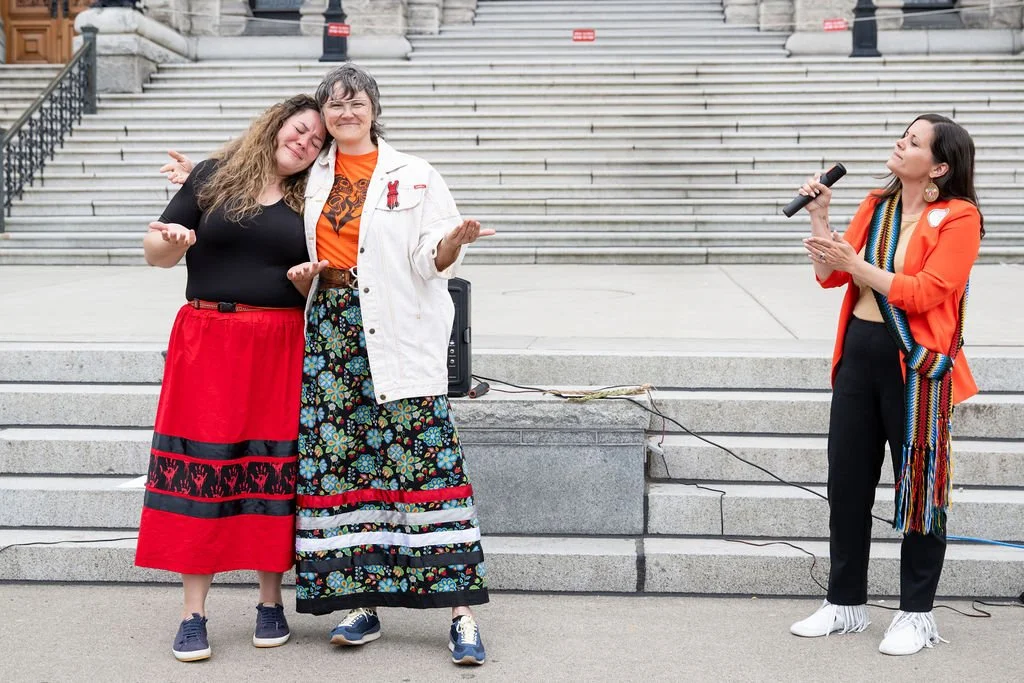Fund the Hands That Catch Our Future: Why Indigenous Midwifery Matters More Than Ever
Jace Poirier Lacerte, lifts up Michif Midwives Nathalie Pambrun and Melanie Mason of the South Island Indigenous Midwives (SIIMS) at a rally at the BC Legislature in Support of Renewed Funding for Indigenous Midwives cut during National Indigenous History Month in British Columbia June 2025
During National Indigenous History Month, I stood on the steps of the BC Legislature alongside two powerful Indigenous midwives—women who have caught babies, protected sacred ceremony, and held the future in their hands.
And I asked the crowd to lift them up.
For one full minute, we cheered. We raised our voices in love and recognition. They stood with their arms outstretched, in a gesture of receiving—something caregivers so rarely get to do.
It was a beautiful, necessary moment.
And it should never have had to happen.
Because the South Island Indigenous Midwives—known locally as the SIIMs—have just been forced to close their doors. Not due to lack of demand. Not due to poor outcomes. But because the Province of British Columbia never truly funded them in the first place.
We are not losing a service.
We are losing a sacred safety net.
I didn’t birth my own child on these lands, but I’ve had the honour of attending ten births here on South Island as a Family Steward. I’ve seen firsthand how Indigenous midwives make the difference between fear and safety, disconnection and belonging. Their presence transforms the experience of birth—not just for birthing parents, but for entire families.
But even with clear, proven outcomes, they have been consistently undervalued and undercounted:
Indigenous midwives prevent child apprehensions by building trust from the beginning
They increase prenatal care access and follow-up when families are most vulnerable
They save money by keeping people out of hospital-based care, where one antenatal visit can cost $900
Their work delivers on BC’s commitments under the Truth and Reconciliation Commission, the MMIWG Calls for Justice, DRIPA, and the In Plain Sight report
And yet—despite all of this—they are not included in provincial workforce plans.
They are not recognized as essential health providers.
And now, they are at risk of disappearing.
How can we address a maternal health crisis while ignoring the very people solving it?
At COYA, we train Family Stewards—doula-trained caregivers who walk alongside birthing and non-birthing parents. Together with midwives, we support the early days of family formation, with the goal of preventing domestic violence and family breakdown before they ever begin.
But without midwives, we cannot do this work.
We are losing the very people we are meant to walk with.
And this isn’t just a funding issue—it’s a legal one.
BC passed the Declaration on the Rights of Indigenous Peoples Act (DRIPA) in 2019. Article 24(2) of UNDRIP is crystal clear:
“Indigenous individuals have an equal right to the highest attainable standard of physical and mental health... and access to all health services, without discrimination.”
If Indigenous families cannot access Indigenous midwives, their legal rights are being denied.
This moment calls for courage. And for commitment.
We are calling on the Government of British Columbia to:
Immediately restore funding to the South Island Indigenous Midwives
Formally recognize Indigenous midwifery as essential healthcare
Include Indigenous midwives in workforce strategy and data tracking
Fund Family Stewards to expand community-based prevention and support
Reconciliation is not a speech. It’s a budget line.
Birth is not a clinical moment. It’s the start of a nation.
And the hands that catch our future deserve protection too.
If you are reading this and feel moved, here are three things you can do right now:
📢 Share this message with your networks—especially elected officials
🧡 Donate to Indigenous midwifery programs or the COYA Family Stewards initiative
✍️ Write to your MLA and demand the immediate reinstatement of Indigenous midwifery funding
We lifted Indigenous midwives up on the steps of the Legislature.
Now let’s lift them up with action.
Author bio (for publication):
Jace Poirier Lacerte is a Mother, Teacher, Auntie, and founder of COYA Family Stewards, an Indigenous-led model that supports families to build legacy during pregnancy, birth, and early parenting. She lives on the lands of the Lekwungen Speaking Peoples, The Songhees and Kosapsum Nations alongside the W̱SÁNEĆ people and has attended the births of 10 families in B.C.

